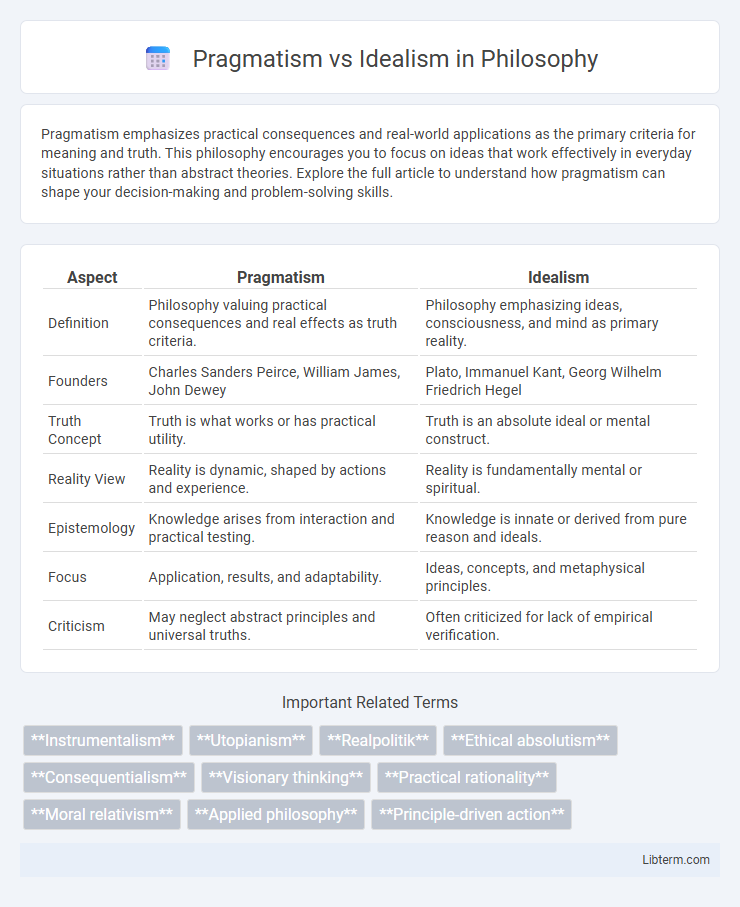Pragmatism emphasizes practical consequences and real-world applications as the primary criteria for meaning and truth. This philosophy encourages you to focus on ideas that work effectively in everyday situations rather than abstract theories. Explore the full article to understand how pragmatism can shape your decision-making and problem-solving skills.
Table of Comparison
| Aspect | Pragmatism | Idealism |
|---|---|---|
| Definition | Philosophy valuing practical consequences and real effects as truth criteria. | Philosophy emphasizing ideas, consciousness, and mind as primary reality. |
| Founders | Charles Sanders Peirce, William James, John Dewey | Plato, Immanuel Kant, Georg Wilhelm Friedrich Hegel |
| Truth Concept | Truth is what works or has practical utility. | Truth is an absolute ideal or mental construct. |
| Reality View | Reality is dynamic, shaped by actions and experience. | Reality is fundamentally mental or spiritual. |
| Epistemology | Knowledge arises from interaction and practical testing. | Knowledge is innate or derived from pure reason and ideals. |
| Focus | Application, results, and adaptability. | Ideas, concepts, and metaphysical principles. |
| Criticism | May neglect abstract principles and universal truths. | Often criticized for lack of empirical verification. |
Defining Pragmatism and Idealism
Pragmatism emphasizes practical consequences and real-world applications as the basis for truth and meaning, valuing experience and experimentation to solve problems effectively. Idealism asserts that reality is fundamentally shaped by ideas, consciousness, or spiritual principles, prioritizing abstract reasoning and the pursuit of absolute truths beyond material experience. Both philosophical frameworks influence approaches to knowledge and decision-making, contrasting tangible outcomes with conceptual ideals.
Historical Roots and Key Philosophers
Pragmatism, rooted in late 19th-century American philosophy, emerged with key figures like Charles Sanders Peirce, William James, and John Dewey, emphasizing practical consequences and real-world applications of ideas. Idealism traces back to ancient Greek philosophers such as Plato, with significant development by German thinkers like Immanuel Kant and Georg Wilhelm Friedrich Hegel, focusing on the primacy of ideas, consciousness, and the mind's role in shaping reality. The historical roots highlight pragmatism's focus on experience and outcomes versus idealism's emphasis on abstract, often metaphysical, principles.
Core Principles of Pragmatism
Pragmatism centers on the belief that truth is determined by practical consequences and real-world applications, emphasizing experience and experimentation as tools for problem-solving. It rejects absolute ideals, focusing instead on adaptable solutions that work in specific contexts, highlighting utility and effectiveness over abstract principles. This philosophy values action and results, viewing ideas as instruments to guide behavior and improve human conditions through continuous testing and revision.
Fundamental Tenets of Idealism
Idealism centers on the belief that reality is fundamentally mental or spiritual, asserting that ideas and consciousness shape the physical world. It emphasizes the primacy of concepts, values, and the mind over material objects, suggesting that truth and meaning arise from intellectual and moral principles. This philosophy contrasts with pragmatism by prioritizing ideals and intrinsic values over practical consequences and empirical outcomes.
Pragmatism in Practice: Real-World Applications
Pragmatism emphasizes practical consequences and real-world effectiveness, guiding decision-making in fields like education, law, and politics by prioritizing outcomes over abstract ideals. In education, pragmatism promotes experiential learning and problem-solving skills, adapting teaching methods to student needs and societal changes. Legal systems influenced by pragmatism focus on flexible interpretations of laws to address contemporary social issues and achieve just outcomes.
Idealism in Action: Impact on Society
Idealism in action drives social progress by inspiring visionary goals and ethical standards that shape policies and cultural values. Its emphasis on ideals like justice, equality, and human rights motivates reform movements and educational initiatives that foster collective well-being. The practical application of idealism often leads to transformative changes in governance, social institutions, and community development.
Comparative Analysis: Strengths and Weaknesses
Pragmatism emphasizes practical outcomes and adaptability, excelling in problem-solving and real-world applications but often criticized for overlooking deeper moral or theoretical principles. Idealism prioritizes moral values and abstract principles, fostering visionary and ethical frameworks, though it may struggle with practical implementation and flexibility. The comparative analysis reveals pragmatism's strength in effectiveness and realism, contrasted with idealism's strength in guiding values and long-term vision, exposing pragmatism's tendency toward short-termism and idealism's potential for impracticality.
Education: Pragmatic vs Idealistic Approaches
Pragmatic education emphasizes practical skills and real-world problem-solving to prepare students for immediate challenges and workforce demands, integrating experiential learning and adaptable curricula. Idealistic education prioritizes the development of moral values, intellectual virtues, and the pursuit of eternal truths, fostering critical thinking and personal growth to cultivate well-rounded individuals. Both approaches shape distinct pedagogical methods: pragmatism targets functionality and application, while idealism focuses on philosophical ideals and character formation.
Pragmatism vs Idealism in Politics and Policy
Pragmatism in politics emphasizes practical solutions and outcomes based on empirical evidence, favoring policies that adapt to changing circumstances and societal needs. Idealism, by contrast, drives political agendas through adherence to abstract principles or moral ideals, potentially prioritizing long-term vision over immediate feasibility. The tension between pragmatism and idealism shapes policymaking by balancing realistic constraints against aspirational goals, influencing legislative effectiveness and public trust.
Bridging the Gap: Finding a Balanced Perspective
Pragmatism emphasizes practical solutions and tangible outcomes, while idealism values visionary principles and moral ideals. Bridging the gap requires integrating pragmatic adaptability with idealistic goals to create realistic yet aspirational frameworks. This balanced perspective fosters decision-making that is both effective in the present and aligned with long-term ethical aspirations.
Pragmatism Infographic

 libterm.com
libterm.com